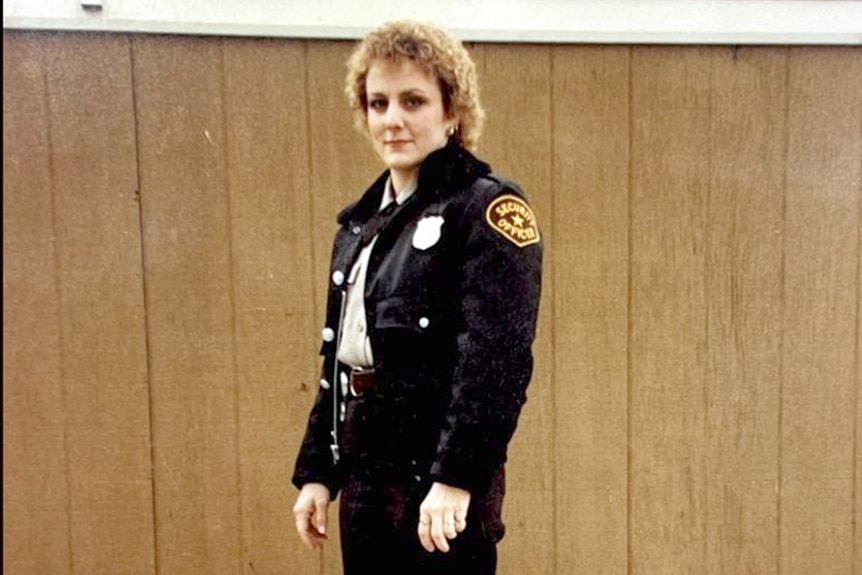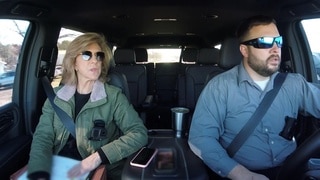Create a free profile to get unlimited access to exclusive videos, breaking news, sweepstakes, and more!
Arrest Made in Case of Mother’s “Gruesome” 1987 Workplace Abduction, Murder
Derby Wagner-Richardson was abducted from her security post in Racine, Wisconsin, and found dead in the trunk of her car. Now, just over 37 years later, her estranged husband has pleaded not guilty.
One family is closer to justice after years of questions.
Former Texas prosecutor Kelly Siegler and Cold Justice regular, homicide investigator Steve Spingola, joined the Racine Police Department in Spingola’s Wisconsin home state to investigate the death of Derby Wagner-Richardson. Her estranged husband was arrested 37 years after the working mother’s murder.
“She ran away from home at 14 years of age and got married young to the wrong man,” said Siegler. “But they did have two beautiful daughters together, and she was getting a divorce and beginning a new chapter of her life when it was all taken from her."
Racine P.D.’s Detective Todd Lauer, Deputy Chief Jessie Metoyer, Lieutenant Sarah Zupke, and Det. Tonya Scarvers teamed with Siegler and Spingola to review the case.
Don't miss the latest in true crime:
Texas Man Fatally Shot Neighbor Who Had Helped His Wife and Baby Flee to Mexico
Kindergarten Teacher Plots With Parents to Kill Ex, Then Tries To Take Out His Mother
How Jennifer Pan's "Web of Lies" Led to a Plot to Kill Her Parents
Who was Derby Wagner-Richardson?
Derby Wagner-Richardson, 28, was a mother of two who “worked her tail off” to raise her children, according to Spingola. She held three jobs, including weekdays at a nursing center in Kenosha and as an instructor at the YWCA in Racine. On the weekends, Derby worked third shift as a security guard at Racine’s Styberg Engineering company, from where she was abducted.
The doting mother was described as having a tough time in her teenage years, according to Lt. Lauer. At 16, she found work as a dancer at a local bar owned by Fred Wagner-Richardson, the man she’d later marry and with whom she shared two daughters.
“There was quite a bit of abuse history, both physical and mental,” Lauer told Cold Justice. “I think it was kind of a living nightmare for a long time for her.”
What happened on the night of the murder?
On March 22, 1987, Derby — who was supposed to check in on the hour of her 12-hour shift at Styberg — failed to clock in at 1:00 a.m. Her supervisor searched the property and called the police when he found no signs of the employee. However, things seemed a little off in the building’s lunchroom and a connecting office, where Derby regularly folded her children’s laundry.
Left behind was Derby’s jacket with the arms pulled through and a broken clock, among other items.
“There were signs of a struggle at a nearby office where the door had actually been kicked in,” said Spingola. “It appears Derby had been attacked and abducted in her own car.”
Police arriving at the 1987 scene found no sign of Derby or her Pontiac Sunbird. But within hours, they found a good amount of the missing woman’s items across town, scattered around roadsides heading away from Racine. Objects included Derby’s makeup bag, car keys, and bloody clothes.
The following morning, around 8:00 a.m., an officer found Derby’s car parked in front of the Styberg Engineering building. The official recognized blood dripping from the trunk of the vehicle.
Police found Derby’s unclothed body inside. The victim only wore one sock, and she had white duct tape still around her mouth. Her throat had been crudely slashed, and her wrists were cut “to the bone,” according to Spingola. The scene was described by Det. Lauer as “gruesome.”
Nothing of physical value could be used as evidence, making it a largely circumstantial case.
“While we always need to consider an unknown person may be responsible for the murder, Derby’s homicide appears very personal,” Spingola said. “She only had one known enemy: her soon-to-be ex-husband.”
Fred Wagner-Richardson Eyed as Suspect
Fred Wagner-Richardson was 18 years Derby’s senior and the father of her two daughters. According to Cold Justice investigators, by the time Fred — who’d allegedly joined the U.S. Military under a false name — was 30, he already had himself a lengthy rap sheet.
While in the military, he reportedly jumped out of the bushes and attacked and robbed someone, resulting in a prison sentence and a dishonorable discharge. After relocating to Racine, he earned two more robbery convictions, but only served a part of a 15-year sentence.
After his release from Leavenworth Prison, he opened the Racine bar, where he met then-16-year-old Derby.
“Fred was a career criminal, but he was still able to own a bar and a few low-income housing units around town,” said Siegler. “He had a reputation for being ruthless in his business dealings and in his personal relationships.”
Derby left Fred in June 1986, filing for divorce in December of that same year.
Physical abuse continued, with records showing an incident in January 1987 — just a couple of months before the murder — when Fred allegedly strangled Derby in front of their daughter to the point that the victim lost consciousness. Fred also punched his estranged wife with such force that he reportedly broke his hand.
That month, Derby was granted a temporary restraining order, which was found with her scattered items around the time of the murder.
According to Victim Witness Specialist Barbara Smith, who helped Derby obtain the stay-away order, Derby said, “He’s going to kill me anyway.”
“She was the first victim who said that to me,” Smith told Cold Justice.
RELATED: Police Say Skeletal Remains of Teen Farmer Dylan Rounds Have Been Found
Why would Fred want Derby dead?
Tensions between the couple ratcheted up on March 21, 1987 — just 12 hours before Derby was attacked — when Derby and Fred met with their lawyers to finalize their divorce. Fred stood to lose a good chunk of his income, including a reported 50% of the properties and 25 percent of rent: sums estimated to be about $250,000.
On the way out of the meeting, Fred appeared so visibly upset that Derby’s attorney called authorities and requested she have police protection.
“I don’t like to be hurt,” Fred allegedly said as he left the meeting.
Twelve hours later, Derby was abducted and killed.
“He was the only person in the world that benefitted from Derby’s death,” Spingola told Cold Justice. “Be we gotta prove that.”
Those closest to Derby, including her now-deceased mother, Ruth (who became an advocate for mothers of murdered children), seemed to think Fred was the most probable suspect. It didn’t make sense to her relatives, including Derby’s aunt, Ellie Schmidt, and Derby’s brother, Bryon Linder, that anyone else would want to harm Derby.
“She was a really good mom,” Linder said of Derby. “She kind of put it all on herself, and I guess it wasn’t enough.”
Cold Justice conducted interviews with many of Derby’s friends and coworkers, including Kelly Williams Cherry, who watched the Wagner-Richardson children on the night of Derby’s murder. She was one of the many people who Derby opened up to about the abuse she faced at the hands of Fred.
“Every time she left the house, she’d always say, ‘Please, under no circumstances — if he comes over here, do not open the door for [Fred],’” Cherry told Siegler and Scarvers. “’I don’t want him nowhere near the girls.’”
Fred would raise his daughters following Derby’s murder.
A Theory of What Happened
Revisiting the crime scene, investigators theorized that since there were no signs of forced entry, the assailant likely followed Derby inside. Derby regularly brought her children’s clothes to work to fold, and backed her car to the door of the lunchroom to take the laundry back and forth.
It was believed the killer gained entry while Derby made one of the trips.
Based on the jacket with the inside-out sleeves, it appeared someone attempted to grab Derby from behind, though she managed to wriggle away and head for the nearby office. Marks on the door suggested Derby locked herself in the office before her killer forced his way inside and attacked her.
“At this point, Derby is likely unconscious,” Spingola speculated. “The suspect taped her mouth with the white duct tape and carried her out to the trunk of her car.”
The tape suggested that the homicide was premeditated and, according to Spingola, Derby’s personal items were strewn across town “in an attempt to throw off investigators.” It was possible that the killer feared they’d be their number one suspect.
Investigators believed the killer took Derby to another location, stripped her down, and killed her, before bringing the car back to her place of work, perhaps because the killer had to retrieve his vehicle.
There were no signs of a sexual assault despite Derby being unclothed.
“With no signs of a sexual assault, I think this was done, actually, to either torture her or humiliate her once her body was found,” Spingola told Cold Justice. “Derby’s killer wanted her to suffer, even after her death.”
A new look at Fred Wagner-Richardson
Cold Justice paid a visit to Fred Wagner-Richardson, now 82 and confined to a wheelchair, at his home. Based on the “volatile” meeting between the couple and their divorce attorneys in 1987, Fred’s history of abuse, and no other suspects that seemed to fit the bill, Fred was the prime suspect for his children’s mother’s murder.
Although Fred’s new wife let officers in, Fred reportedly didn't talk.
Still, the team felt they had enough evidence to bring the case to the district attorney, which they explained to Derby’s loved ones. According to Derby’s brother, Bryon Linder, their mother would have said, “Thank God.”
“There aren’t enough words of appreciation,” said Derby’s aunt, Ellie Schmidt. “I think, for me, it’s probably more closure for my sister. It was so wonderful to hear how she’s not been forgotten. She can rest easy now.”
On March 24, 2024 — just over 37 years after the murder — Fred Wagner-Richardson was arrested for the 1987 murder of Derby Wagner-Richardson.
On Wednesday, April 10, 2024, the suspect pleaded not guilty to murder, according to CBS Milwaukee affiliate WDJT-TV. A status conference has been scheduled for July.
He is presumed innocent until proven guilty beyond a reasonable doubt by the law.
Watch all-new episodes of Cold Justice, airing Saturdays at 8/7c on Oxygen.





















